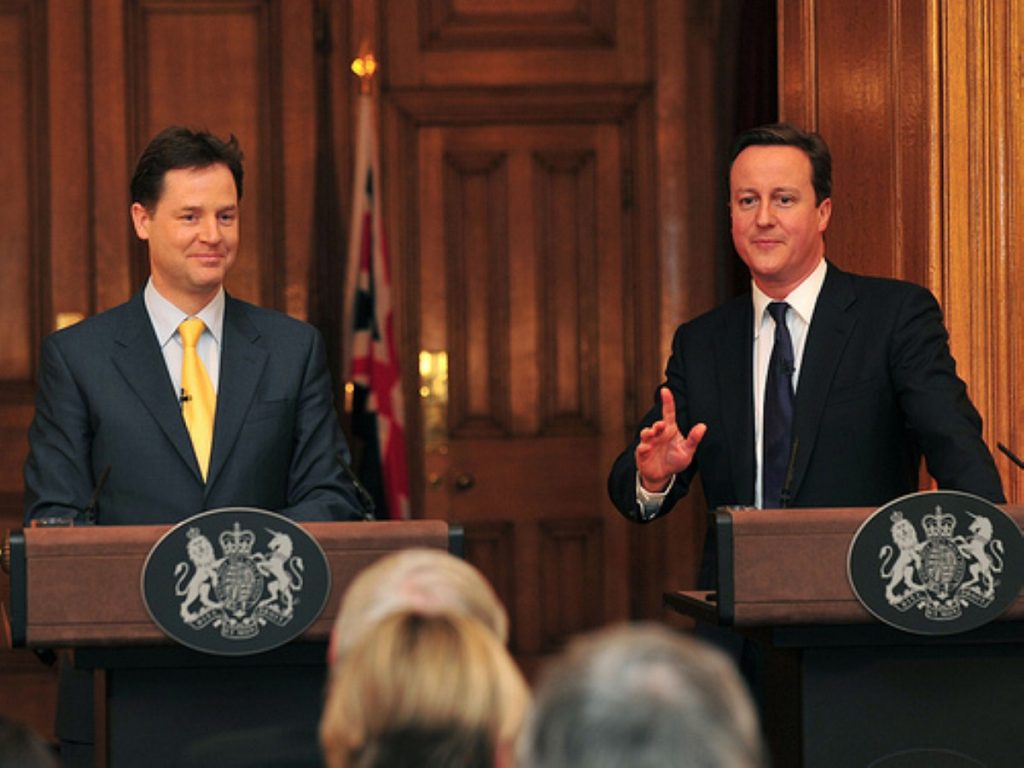Midterm review sketch: Empty document fails to hide coalition tensions
It was all going so well. David Cameron and Nick Clegg were restating their "serious, five-year commitment" to the coalition. Never mind that many of the policies in their original programme for government haven't quite made it this far or that both the Conservatives and the Liberal Democrats face troubling polling numbers. Or the grumbling backbenchers who are beginning to pose a threat to the coalition's five-year longevity. This was supposed to be a press conference of bright bushy-eyed new year optimism. A fresh start for a jaded project.
Not much was new about this dynamic. Whereas the Rose Garden was charming and novel, we have now grown familiar with the tedious, forced bonhomie which now prevails between these two men. It says it all about this press conference that the most exciting moment came when Cameron referred to the coalition as a "Ronseal deal – it does what it says on the tin". Nick Clegg, not a man known for his comic timing, attempted to joke that the prime minister was offering the "unvarnished truth". Cue groans. Like the worst comedians, he gets a better response from his follow-up gags than the main joke. "Well, I thought it was funny," Clegg added, prompting a more genuine response.
Cameron and Clegg are dab hands at looking attentive while listening to the other speak. On this occasion Dave went further, taking care to repeatedly look to Nick for affirmation that what he wasn't saying was too right wing. When Clegg began speaking, he did the same thing. But not as much: the Liberal Democrats are being nagged by people they think are clever to be more independent-minded, so it is surely no coincidence the DPM did less glancing to his left.
He balanced this out by being more open and frank than his Tory colleague. There were "lots of things we've all learned", he said, turning to Cameron with a sweet smile on his face. Cameron smiled back, but not with his eyes.


Clegg continues to cultivate a rather overdone rhetorical style, in which pauses are inserted for what can be no other purpose except to add gravitas. The coalition "will, in my view, stand – the test – of time," he pronounced. The Lib Dem leader is now a polished performer. Tomorrow's benefit upratings bill will save £5 billion, he claimed. "This is the equivalent to employing" – then came a pause, as if he was doing the sums in his head – "140,000-odd teachers". What powers of mental arithmetic! It was almost as if he hadn't memorised those figures beforehand.
Cameron's focus seemed to be on demonstrating his first-among-equals status. It is surely no coincidence he sent a rare signal about his future leadership ambitions the day before today's focus on what is, after all, only the next two years. Dave wants to continue in No 10 until 2020. He underlined the fact that "I" failed to win a majority in 2010.
Cameron hopes to outlast this government. Clegg does too, but when he talks about wanting to be prime minister it sounds like complete fantasy. Because it is. "I certainly want to see the Liberal Democrat presence in British politics increase over time," he said, optimistically. In a century or two, perhaps.
Eventually the questions from eager journalists, who still hunger for the old monthly press conferences offered by Tony Blair and Gordon Brown, began to focus on the nitty-gritty – and the areas of disagreement. Some of the proposed reforms contained in the review document itself – which was printed on very nice quality paper, by the way – will actually foster disagreement, like the boundary changes vote. The Lib Dems really are prepared to actively kill this reform, which will deliver the Tories an extra 20 seats, because the Tories dug in against Lords reform.
"I regard the changes as a package," Clegg said primly. "If one part of a deal is not right, then it's OK for the other side to say, 'well, we're going to tweak the package'." Cameron instantly declared the next question was to be the last. An unseen divide of disagreement appeared to have fallen between them. A tension had been created which could not be undone. It had been there all along, of course, but now everyone was aware of it. Cameron and Clegg wrapped up quickly, and then made a dash for the exit.
They couldn't even make it to the end of their 'we're still united' press conference without starting to bicker.
It is easy to hold a press conference, but much harder to actually keep these two parties together. There was very little about dispute resolution, beyond the usual oft-repeated clichés about being grown-up and mature and resolving differences like grown-ups. Nor did they accept coalition unity is going to get harder and harder as the next general election approaches. "This is a full five-year coalition," Cameron said, happy to work in absolutes.
They remain committed to each other, but all the signs are this has become a loveless marriage.












